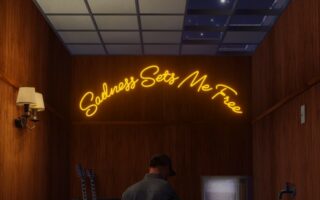
Richard Melville Hall has bought the t-shirt made for people who’ve bought the t-shirt; punk, vegan, Christian, seller of tens of millions of albums, enthusiastic drug guzzler (all of these things were not at the same time obviously), the man they call Moby has turned indulging virtue and vice into a fine art.
More recently, attention has switched away from music and towards his hugely candid pair of autobiographies in which he’s talked about the vacuum in his soul that attaining fame and fortune – largely via his 1999 album Play – created, and how he filled it with anything he could lay his hands on. In them, he laid bare the impossible process of following it up and the damaging psychological effect of the mediocre (by comparison) sales of subsequent records since has had.
The first thing to say about All Visible Objects is that it isn’t going to fix that. There are some clear reasons for this which we’ll cover later, firstly though it’s worth reminding ourselves that the project is a philanthropic exercise, with all the profits going to a range of charitable organisations, as did the proceeds of his recent equipment auction. It’s also true that many of the things which you might expect from a Moby album are present as expected: opener Morningside seems to have come straight from a rave without having gone to bed, wailing diva sample circa ’91 and tipping hi-hat, while those who haven’t stopped by since the Play era will definitely be satisfied with the dinner party background vibes of Forever and Roxy Music cover My Only Love.
Business as usual then? Well, sort of. Moby has spent his entire career as both a musician and an activist, and whilst sometimes that’s taken a back seat there’s an anti-establishment streak of sorts here in Rise Up In Love (theme: Hug a stranger) and Power Is Taken (theme: Techno terrorist takeover), the latter featuring street ready vocals from the Dead Kennedy’s D H Pelligro. That has a real wash of angry energy to it, but on the seemingly never ending Too Much Change the anti-futurist sentiment just turns mawkish and dull.
This over earnestness is buttressed with an anthology approach to track selection: the producer has recently been making lengthy ambient collections, and for every dancefloor orientated tune like Refuge there are Quinoa friendly pieces such as Tecie and the piano led title-track, a nine-minute opus which brings things to a sombre close.
All Visible Objects cuts an ambitious slice through much of its creator’s fascinations old and new, be it riotous anarchy, delirious hedonism or entropic comedowns. This might’ve worked too, but there’s simply not enough conviction in these songs; no real rage, joy or paranoia to compel the listener into feeling empathy.
A man who bears the scars of a life lived, Richard Melville Hall has done many things. It’s surely too late for him to be caught treading water now.



